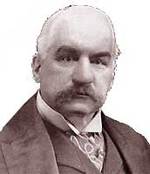My great effort of 2006 was to rationalize the behavior of American voters against the seeming insanity of King George. I concluded it’s part of an historical pattern that goes back to the beginnings of the Republic, political theses that expire yet walk to the next crisis like zombies, Americans chained to them until younger Americans face things squarely and create new myths for their own time.
So what do I make of this Ed Whitacre delusion that advertising revenue will justify his purchase of BellSouth? That specifically ad-supported wireless, and AT&T TV, and ad-supported Internet will cause us all to sing his financial praises and forget all this nonsense about net neutrality?
By peering into the deep mists of satire, and the movie The Last Shot. (Above.)
For those who’ve forgotten it (and it was a singularly forgettable film) the FBI set up a movie company as a front to break the Rhode Island mob, and the lead agent (played by Alec Baldwin) was slowly seduced into thinking he really was in the business. The con-being-conned with show business itself as the ultimate seductress.
In this case the delusion is about Madison Avenue, and the idea that a captive audience can be monetized without cost. This is what cable does with its local ad avails, Whitacre thinks. You’re already paying for the cable service, the programming cost has already been paid, and those minutes of extra ads inserted into Food Network programs is "free money."
This has been a holy grail on the Internet for a decade, and the
business model doesn’t work. ISPs like NetZero tried giving away
dial-up service, then offering it at minimal prices, while taking a
piece of the browser window for "relevant" ads based on your
clickstream data. This idea that clickstream data will let you
deliver a custom ad stream that merits a click has been
tried-and-tried-and-tried again. It doesn’t work. The costs of the
programming and the data load exceed the extra clickstream
revenue.
It’s the communications version of the perpetual motion machine. You
look at it on paper and you think it should work, and it must work, but
it just doesn’t.
Exporting this nonsense to wireless won’t work either. You think
people want to listen to ads while they’re waiting for someone else to
pick up the phone, or that they will look at ads on a tiny cellphone
screen? You think people are loony? People spend much of their time
avoiding ads, and when ads are pushed at them anyway they ignore those
ads.
We’ve seen it and seen it. DVD makers tried to force people to watch
trailers by disabling the fast-forward. TiVo patented the idea of
disabling fast forward on ads for its service. Billboard companies finally learned that the way to get more for their inventory was by limiting the number of billboards they put up. People don’t want ads.
They avoid the poisoned DVDs, they cut their TiVo purchases, and if the
ads come on anyway they hit mute and take a leak until the ads are over.
This whole concept of advertising is exceedingly 20th century
anyway. It’s based on an economics of scarcity, the idea being that the
power to choose is in the hands of the medium, not the user. This
worked when there were only three TV networks, but it is increasingly
ineffective. While Internet ad revenues are rising, these are mainly
substitution effects, people transferring money out of other media. The
ad pie itself is not growing. And those who produce programming provide
a far more important service to users than those who just pipe it in.
In the end this nonsense, like Whitacre’s nonsense about eliminating
net neutrality, is based on the insane idea that, with costs constantly
decreasing and service levels arbitrarily reduced, a monopoly can be
maintained regardless of the political environment.
This is the greatest delusion of all. The slow speed of today’s
Internet services, combined with faster services available in every
other market around the world, are going to demand an end to the
monopoly in very short order.
J.P. Morgan (right) worked with a different set
of economics, the argument being that a nation with limited capital
could not afford competition in vital services, or else most people
would not be served. That world does not exist anymore, and no amount
of governmental manipulation is going to bring it back. Ed Whitacre has
wedded himself to a dieing political system, to a dieing business model, and the AT&T monopoly
is going to die with it.
San Antonio is not going to be the center of the universe for very long, and the only question is whether its time on top of the heap will exceed that of its predecessor, Jackson, Mississippi.
The sooner it ends the better, because I’m tired of
living with delusions.














Regardless of what Ed says to the press, buying Bellsouth was about one thing — control. No more sharing the power in terms of Cingular. One less voice in shaping the future of IPTV. One less voice that might (as unlikely as it was) disagree on policy issues like Net Neutrality. One less company to bid against in wireless auctions. I could go on . . .
Regardless of what Ed says to the press, buying Bellsouth was about one thing — control. No more sharing the power in terms of Cingular. One less voice in shaping the future of IPTV. One less voice that might (as unlikely as it was) disagree on policy issues like Net Neutrality. One less company to bid against in wireless auctions. I could go on . . .